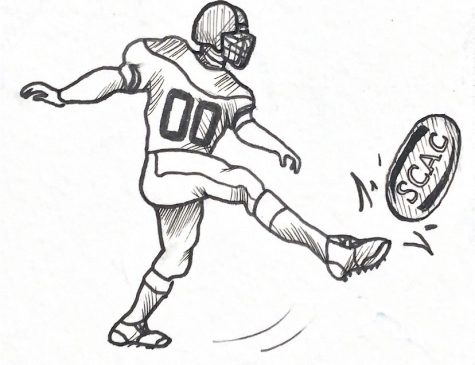Sarah Everard is every woman
For vulnerable people, going on a walk or run isn’t always just that
Content warning: This story includes mentions of murder, femicide, harassment, and sexual assault.
For 33-year-old Sarah Everard, March 3 was the same as any other day. She was visiting a friend in Clapham, London, a town 50-minutes away on foot from where she lived. Everard left her friend’s home for Brixton at around 9:00 p.m., unaware that her life would soon meet a fatal end.
The path home that she chose to take that day was familiar to her. It was one that so many other women had walked hundreds of times prior to Everard. For the young woman, it was supposed to be “just another day.”
When her boyfriend failed to get in contact with her the next day, he phoned the police and reported her as missing. A few days later, with Everard still missing, a Metropolitan police officer was arrested on suspicion of kidnapping in connection to her disappearance. Along with this officer, a 30-something year old woman was arrested on suspicion of assisting an offender.
Everard’s remains were found just a few days later, prompting outrage in the United Kingdom, and all around the world. Kate McCann, political correspondent, tweeted a thread in response to Everard’s murder.
“What happened to Sarah Everard has hit home hard for so many women because we make the calculations she did every day too. We take the longer, better-lit route, push the fear aside for the voice that says ‘don’t be daft, you’ve every right to walk home alone at night and be safe.’”
McCann continued.
“Tell friends ‘it’s fine, it’s just around the corner, I’ll text when I’m back’ …but still we make a plan – Keys gripped between fingers we map the corner shops we could duck into en-route. Swap shoes for trainers in case we need to run. Keep our music low or turned off.”
Ultimately, no amount of precaution on our part can stop murderers and rapists from being just that. Women, non-cisgendered and trans people don’t get murdered because they lack precaution; it is always the fault of the perpetrator.
Still, going out every day feels like a game of survival. Though we are always in danger, no matter how much precaution we take, I wanted to share a few tips for people who feel unsafe when they walk, run, or generally exercise in public places. I’ve also included some tips for people who are privileged enough to never have to worry about being attacked in public, and how to be a better ally to the vulnerable.
- Never post your location during your exercise, especially if it is a place you go to regularly. This allows for potential perpetrators to keep track of your whereabouts and use context clues to find your running place.
- Switch up your running locations. Though you may not notice, other people definitely notice you. In my own experiences, I’ve been told by men who I’d never seen before that they’ve noticed me at a location every day. Terrifying.
- Exercise at different times of the day and different days of the week. Though this seems like a hassle and a real obstacle to a consistent schedule, perpetrators are less likely to keep up with your patterns if you switch it up.
- Always carry pepper spray, a pocket knife, or other forms of protection. No matter how safe or familiar your running path is, every day is a new opportunity for someone to attack you. If you feel comfortable carrying it, consider buying protection.
- Never play your music too loud. This one totally sucks. I get it. What’s a fun workout without loud music anyway? Well, you should always trust your gut. If something feels off or you hear unusual noises, shut off your music and assess the situation.
- Always have your GPS location on. This will ensure that were you to go missing or be abducted, people can find you faster, and hopefully, alive.
- Always carry a form of identification. If you were to be found, alive or not, authority officials will be able to identify you immediately and begin their investigation.
- Let people know your location before your run. Whether a roommate or your parents, let someone know which place you’ll be exercising at that day in case they need that information later.
If you’re surprised by the above tips and the lengths some people have to go to, you’ve most likely never had to worry about these sorts of things. Below, you’ll find some tips about how to be a better ally to people who don’t have the same privilege.
- Always walk on the other side of wherever the other person is at, or as far away from the person as possible. Though you may think you are “one of the good ones,” we have no way of knowing that, so your presence is an immediate threat to our safety, whether you recognize it or not.
- Don’t try to approach the person or engage in conversation. There’s nothing scarier than being approached by a man or another stranger while you’re just out for your daily run. We don’t want to socialize with anyone.We are merely trying to exercise and make it home safely.
- If you see someone staring or observing a vulnerable person, keep your eyes on them until you’re sure they are safe, or until the other person has left. If you feel comfortable enough and have the ability to, call out the person, or notify the runner that they are being watched by someone.
- Never follow someone in your car. It’s horrifying to be followed by a car. Whatever you have to say to someone is most likely unimportant and should be kept to yourself.
- Generally, keep to yourself unless you feel the need to intervene or warn someone. We are just there to get our exercise in and want nothing more than to be left alone and return home safely.
So there you have it. No matter who you are, or where you’re going, there’s always the risk of becoming someone’s crime of opportunity, even in broad daylight.

I'm a senior Computer Science major and a Classical Studies minor from Newton, North Carolina with a passion for art. I also work at the Center for Experiential...















